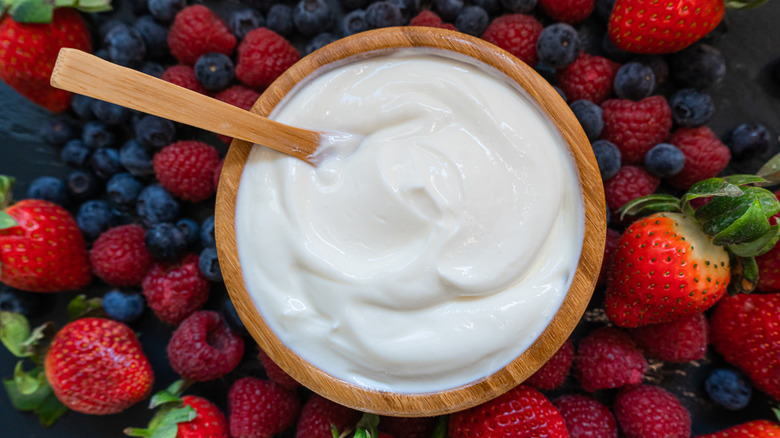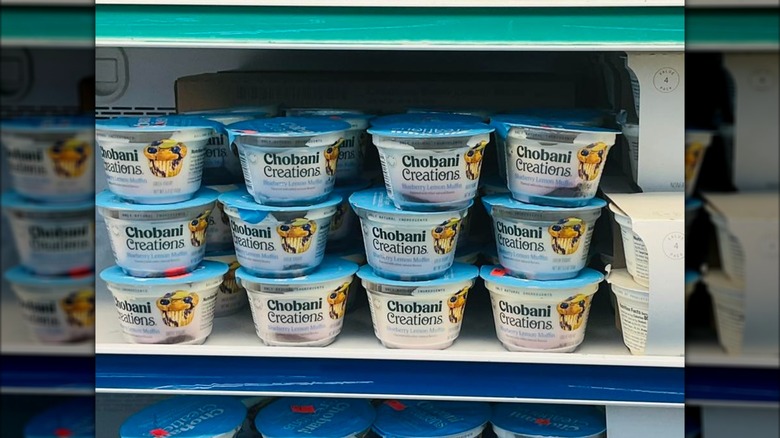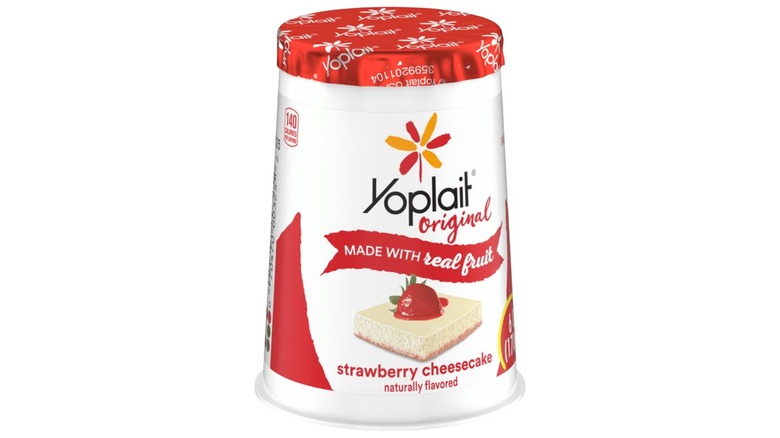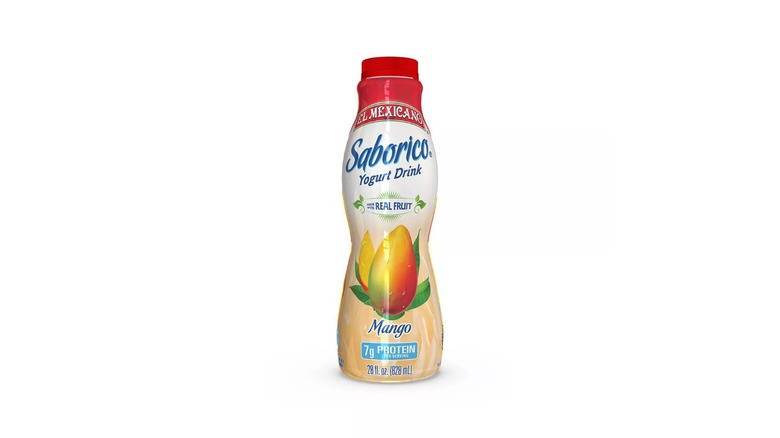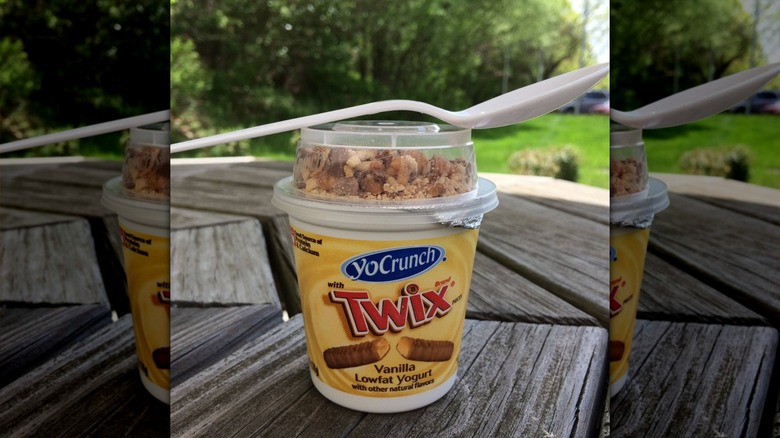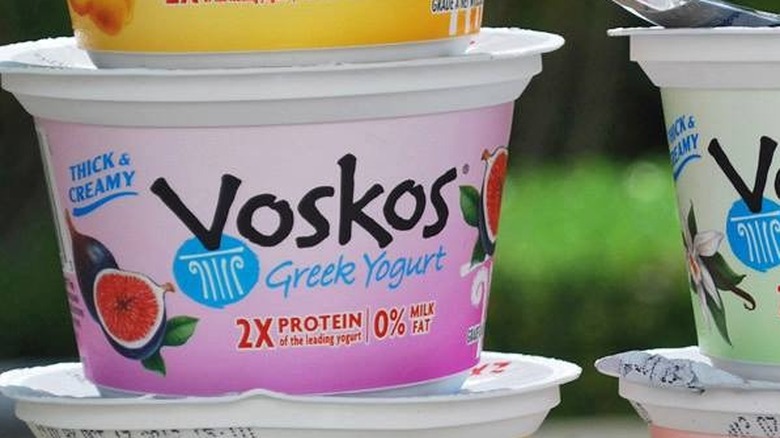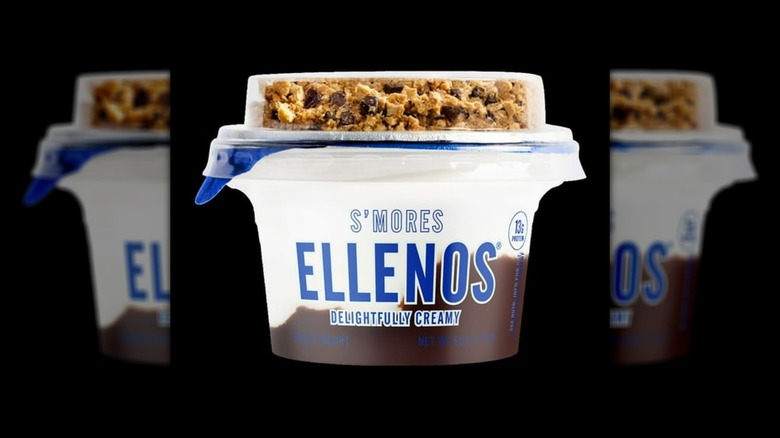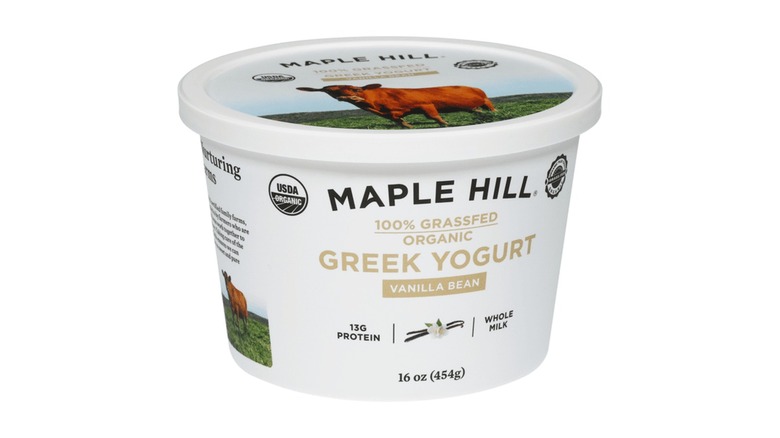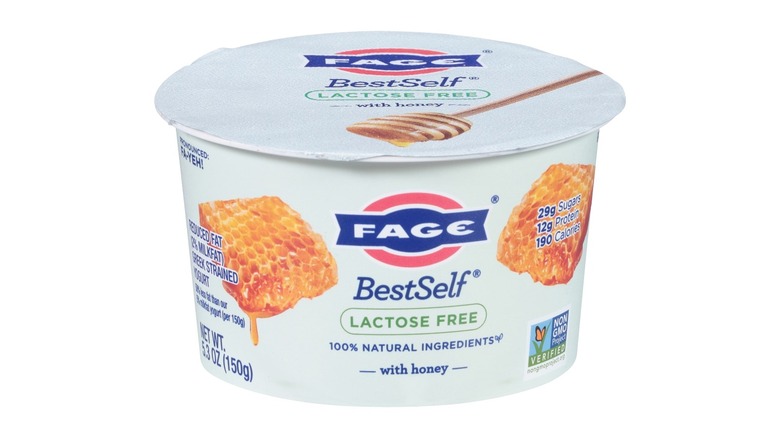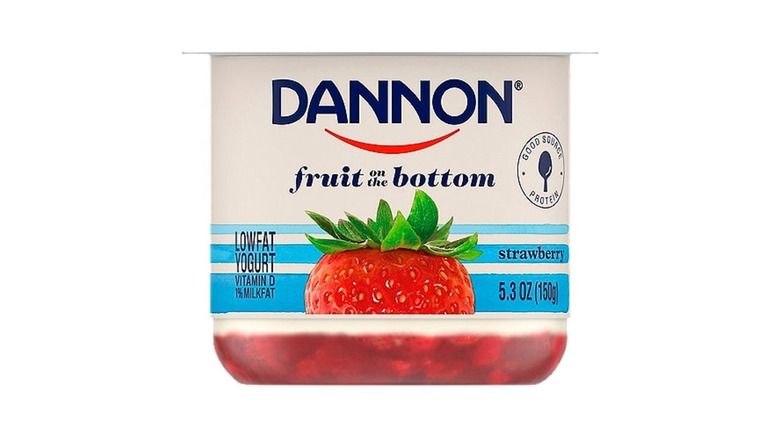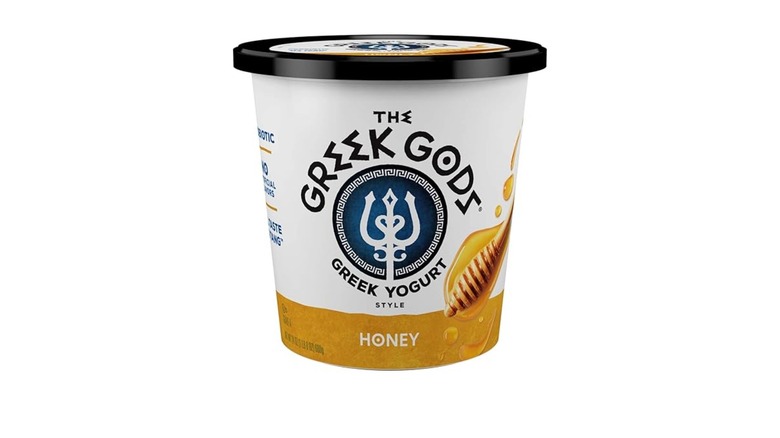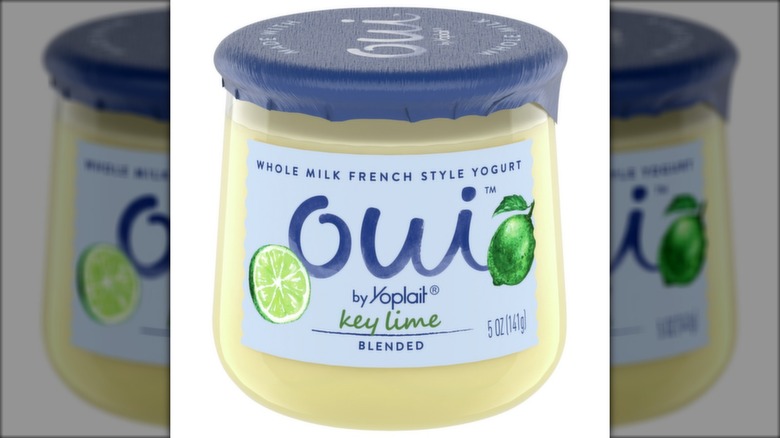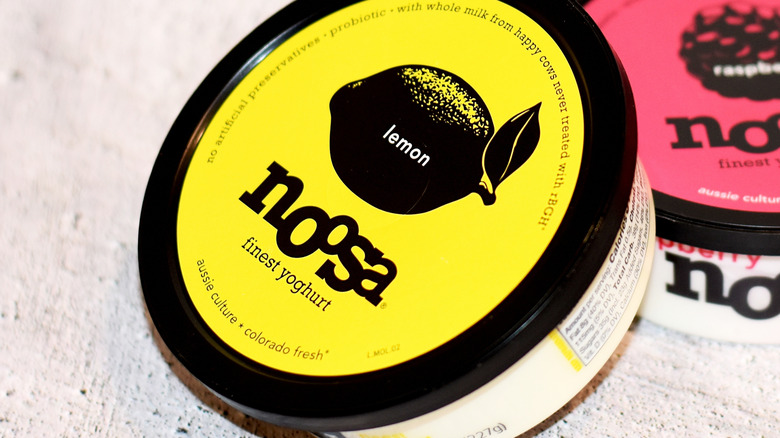12 Of The Unhealthiest Yogurts On Grocery Store Shelves
We may receive a commission on purchases made from links.
The dairy section of every supermarket contains an untold number of yogurt brands, with each boasting several different flavors and nutrient options. Some brag about their protein content, others claim they are low in sugar, while others try to entice you with trend seasonal flavors, such as pumpkin spice.
Done right, yogurt can be a wonderfully healthy snack, packing much-needed protein and calcium. But not all yogurts are built equal. A lot of yogurts out there — even those purporting to be healthy — contain a lot of added sugar, saturated fat, and cholesterol, making them anything but healthy. Added sugar, in particular, is a red flag when seeking healthy options. Added sugar is precisely that: Unlike natural sugar in, say, fruits, this is sugar added to sweeten a product. Too much added sugar in diets is one of the biggest contributors to obesity in the United States.
Brands, of course, love to stamp their products with health claims, but don't exactly shout about the unhealthy stuff. Fortunately, U.S. law mandates nutritional labels. We've used this handy data to help cut through the marketing spin and figure out which yogurts are among the unhealthiest on grocery store shelves. A lot of these yogurts are not an ideal start to a heart-healthy morning.
Chobani Creations Blueberry Lemon Muffin
Don't get us wrong, we love Chobani. This upstate New York Greek yogurt empire has changed the game, with competitors also jumping on the new taste for Greek-branded yogurt. Many of its products are very healthy with exceptionally high protein content — some with as much as 30 grams — and little to no added sugar. But some Chobani products are less than healthy.
Chobani Creations Blueberry Lemon Muffin contains lemon yogurt, mixed with actual blueberries. However, it's important to note that it is dessert-inspired, with the nutritional label certainly reaffirming that this is more dessert than breakfast or a healthy snack. The 14 grams of added sugar here come in at a whopping 28% of your daily recommended limit, which is a lot for a relatively small container of yogurt. You might as well just eat the dessert rather than the yogurt inspired by it.
Saturated fat here is another red flag, with 3.5 grams, which is 18% of the recommended amount. Its protein content at 10 grams is solid, but when paired with that much sugar, this is a hard pass if you want something healthy. In fact, you may want to stay away from the entire dessert-inspired Chobani Creations line, which all contain plenty of added sugar.
Yoplait Strawberry Cheesecake
Yoplait is one of the most popular yogurt brands in America, and it's easy to see why. Its product line is affordable and, with plenty of options to choose from, extremely varied. However, these products aren't always healthy.
On the surface, Yoplait's Strawberry Cheesecake sounds like one of its healthier options. Yoplait advertises that it is made with real fruit, and the ingredients label does list strawberries (but there's also carmine for color). It is low-fat with only 1.5 grams of total fat and 1 gram of saturated fat. There's a high amount of calcium at 200 milligrams, or 15% of your recommended daily consumption. There's also a fair amount of vitamin D and protein, with 5 grams of the latter in each tub.
But where Strawberry Cheesecake has us saying no, thanks, is its added sugar content. Each serving contains 13 grams, or 26% of the advised daily value. This is simply too sweet for a healthy yogurt. Yoplait does manage to pack in a bunch of good stuff, but something truly healthy is healthy all around.
Saborico Mango
El Mexicano, the California company behind Saborico yogurt, started as a small business in 1981 that sold artisanal Mexican cheeses and creams to local grocery stores. Today, it is a market leader in Mexican-style dairy products — but, alas, some of its yogurt products are among the unhealthiest on store shelves.
Take its Saborico Yogurt Drink Mango. Its front label highlights that it is made with real fruit (it does list mango among its ingredients, but it also lists artificial flavor) and Grade A milk, as well as containing 7 grams of protein. So far, so good, except once you turn around the bottle, you'll see that it's packed with 20 grams of added sugar. That's 40% of the added sugar you should ideally be consuming in a day. And keep in mind that's all in a single bottle of 207 milliliters.
The fat content is also high. Its total fat comes in at 6 grams, and the saturated fat — which is more widely scrutinized by nutritionists — comes in at 4 grams, or 20% of the daily recommended limit. You're gonna have to say no to Saborico.
YoCrunch Twix
YoCrunch is a brand created by the French yogurt giant Danone, offering plenty of delicious and exciting flavors. Most of these are partnerships with famous candy or cookie brands, such as Snickers or Twix. Unsurprisingly, that means they're not the healthiest products aroud.
The YoCrunch Twix comes with a yogurt container and a separate container of Twix bar pieces — cookie pieces wrapped in caramel and chocolate — to be added to the yogurt. Eat as advised, and you're looking at 18 grams of added sugar. That's 36% of your recommended sugar intake. Saturated fat content is also relatively high — especially for a yogurt containing just 180 calories — at 2.5 grams.
With only 5 grams of protein, this yogurt generally provides little nutritional value. The one upside is the fair amount of calcium and vitamin D. YoCrunch sounds yummy, but treat this more akin to candy than a normal yogurt.
Voskos Nonfat Exotic Fig
Voskos Nonfat Exotic Fig is a prime example of why you need to read beyond the large and loud messaging the brand wants you to read on the packaging. Voskos boasts that its small yogurt is blended with real figs, contains zero fat, and is twice as high in protein as your ordinary yogurt. At 11 grams of protein for a 150-gram serving size, that really is a good amount.
Voskos has jumped on the protein optimization trend. A high concentration of this much-in-demand nutrient is advertised on numerous yogurt products as a way to sell healthiness to consumers. But impressive protein content can often mask less-than-healthy ingredients. Voskos Nonfat Exotic Fig contains 22 grams of sugar, and while its label does not tell us how much of that is added sugar, it is a fair assumption that it makes up a decent percentage, given that, after milk, cane sugar is the second listed ingredient. Don't get taken in by the added protein when there's plenty of added sugar.
Ellenos S'Mores Flavored Yogurt
Ellenos is another yogurt brand that has gained popularity in recent years. Its yogurt features the richer, creamier texture of Greek yogurt, with some healthy options to choose from, such as the plain unsweetened variety. One of its more unhealthy yogurts is the Ellenos S'Mores Flavored Yogurt. This features both a topping container and a puree on the bottom. The puree tastes like campfire-toasted marshmallow and chocolate, while the topping to be poured on the yogurt consists of crushed graham crackers and mini chocolate chips. That's quite a lot for a yogurt, as proven by the nutritional label.
There are 14 grams of added sugar, 13 grams of total fat, 9 grams of saturated fat, and a good amount of cholesterol in each tub of Ellenos S'Mores Flavored Yogurt. The only redeeming value we see here is the 13 grams of protein, but that is arguably not enough protein to balance out all the unhealthy ingredients. Save the s'mores for actual campfires and opt for a healthier breakfast.
Maple Hill Vanilla Bean Greek Yogurt
Maple Hill is another brand meeting the demand for tasty Greek yogurt. Its products include live probiotics (like most Greek yogurts) and a commitment to 100% grass-fed organic dairy. The Maple Hill Vanilla Bean Greek Yogurt also contains pure organic vanilla extract, as well as an impressive 13 grams of protein per serving. Maple Hill yogurts come in larger sizes than your typical yogurt at 16 ounces in each tub, with roughly 2.5 servings per container.
But even eating a single serving size comes with 13 grams of added sugar, or 26% of your daily recommended limit. That means it contains as much protein as it does added sugar, and yet Maple Hill only chooses to promote one of these attributes on the front of each tub. Eat the whole thing in one sitting, and you're consuming around 32.5 grams. There are also 6 grams of total fat and 4 grams of saturated fat per serving.
FAGE BestSelf Honey
Founded in Athens in 1926, FAGE was one of the first Greek yogurt brands to arrive in the U.S., with a large selection of small and large creamy yogurts. A lot of the yogurts it sells are a perfect addition to a healthy breakfast or a great quick snack. Its BestSelf lactose-free yogurt line, however, leaves much to be desired in terms of healthy eating. Each 150-gram tub of FAGE BestSelf Honey contains 25 grams of added sugar, or nearly half of the added sugar you should ideally consume in a day.
Protein content is high at 12 grams, but this yogurt fails our protein-to-added-sugar rule. If there's more added sugar than protein, it's hard to justify a yogurt as a healthy choice. And in this case, that rule is violated by a ratio of more than two to one. Also, there's not even that much calcium in this yogurt. The honey is a nice (and tasty) addition, but the nutritional values are too off balance to reach any other conclusion.
Dannon Fruit on the Bottom Strawberry
Dannon is one of the most recognizable yogurt brands in the U.S. (although it is actually part of a French company that markets itself as Danone elsewhere). Easily recognizable thanks to its swooping red logo, Dannon does offer healthy options. However, its Fruit on the Bottom Strawberry may be its sweetest container of yogurt.
Fruit on the Bottom is often preferred because of the sweet puree, but it does come at a cost. With 12 grams of added sugar in 150 grams of yogurt, it ranks first in sugar content among all the Fruit on the Bottom options (the other three are blueberry, peach, and cherry). The protein content also isn't overly impressive at just 5 grams. To give credit where it's due, however, there is a good amount of calcium, vitamin D, and potassium, while the calories from fat clock in at a modest 15.
The Greek Gods Honey Greek Yogurt
There are some things worth praising in The Greek Gods Honey Greek Yogurt. Its calcium and potassium levels are high at 20% and 8% of the recommended daily consumption, respectively. But that's about it. The added sugar content comes in at 15 grams per serving. That's 30% of your advised daily limit. And that's only per each 170-gram serving of yogurt. The 24-ounce container contains 680 grams. Eat the whole thing, and you've consumed 120% of the amount of added sugar you should consume.
Cholesterol is relatively high at 25 milligrams per serving, and so is the amount of saturated fat at 4.5 grams. If you ate the whole container, you'd almost be consuming all the saturated fat you should eat for a day. Each serving also contains 7 grams of protein. We can only imagine that the Greek Gods enjoyed healthier yogurts.
Oui by Yoplait Key Lime
A growing trend in the supermarket yogurt aisle is yogurt dressed up as dessert. Oui is a line of yogurts from Yoplait that is advertised as French-style yogurt. Each yogurt comes in a charming small glass jar, similar to those usually used for sweet treats like panna cotta and tiramisu. If that's the point, then we should be clear that while this is found in the yogurt aisle, it is at least half dessert.
A jar of Oui by Yoplait Key Lime comes with 8 grams of fat, 5 grams of saturated fat, and 14 grams of added sugar. Cholesterol is also on the higher end for a yogurt brand at 20 milligrams, while protein content is low at 5 grams. On a slightly more positive note, it does contain a decent amount of calcium at 15% of the daily recommended value.
If you prefer your yogurt a bit sweet, you can always find healthier ways to sweeten it at home. Conversely, if you want to mix yogurt and dessert, you can do the real thing and use yogurt in a cake recipe.
Noosa Lemon Yogurt
Noosa yogurt has transcontinental origins. Back in 2007, Australian Koel Thomae decided to bring her favorite yogurt recipe from her hometown of Noosa on Queensland's Sunshine Coast to Colorado. Soon afterwards, she teamed up with dairy farmer Rob Graves to construct the Noosa yogurt factory on Graves's farm. Today, the pair makes creamy yogurt featuring various flavors of puree, from hot honey to cinnamon roll and tart cherry to coconut.
While these yogurts are smooth and delicious, they're not the healthiest bunch. Noosa Lemon Yoghurt (that's not a typo — keeping with the Australian theme, they spell "yogurt" the Aussie way) contains a shocking 25 grams of added sugar. That's 50% of the daily recommended limit. Additionally, the cholesterol is also through the roof with 45 milligrams.
The 8-ounce container has 320 calories, of which 126 are from fat. Total fat is 14 grams, with saturated fat at 9 grams or 45% of the daily value. According to the company history, Thomae decided to make yogurt after tasting a delicious batch with passion fruit puree. With so much fat and sugar, we imagine it was spectacular, but this yogurt (or yoghurt) is not ideal if you're seeking a regular healthy snack.
